

 |
 |
|
September 2.--This morning, as I expected, the men were, most of them, very drunk, especially L'Amirant, and two of them were missing, which obliged us to run in every direction to ferret them out. ... ...It was noon before we got away from Prairie du Chien. These Canadians become very sulky when they are forced away from a debauch, as they love to keep it up for several days, and to be dead drunk at least once a day. I was obliged to be very rough with two of them to get them into the canoe; but a serjeant of one of the American regiments, a very respectable man, had, with the permission of his officers, obtained of me a passage to Fort Snelling, at the mouth of the St. Peter's, and I was glad of his presence upon this occasion, for after we had got matters sufficiently arranged to push out into the river, the serjeant and myself were obliged to hold L'Amirant by bodily force until we were in the stream; but the moment we let go, the fellow attempted to jump overboard, and it was more than an hour before the fumes of the liquor had sufficiently evaporated to make him available again. |
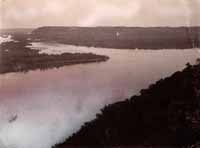 Wisconsin-Mississippi Confluence |
|
We passed Ferribaw's Prairie, an exceedingly pretty scene, terminated to the east with graceful green slopes, crowned with mural precipices resembling the castellated rocks on the Wisconsin, but more developed and imposing. The Mississippi here is more than a mile in width, including some very fine islands. The bluffs on the west side corresponded with the strata on the east, and consisted of limestone, alternating with sandstone and cherty beds. Paddling against the current of the Mississippi we found a very different thing from descending the Wisconsin in the easy way we had done; and, as I thought the men would be all the better after their debauch for a long night's rest, I gave the signal, after making about twelve miles, to pull to a very charming-looking island, which offered a good encampment. I thought that at this distance from Prairie du Chien the men would hardly attempt to run back to their Cytherea, but determined to watch them closely. Just where we landed the islands were so numerous that it was impossible to see both the banks of the river: the grass was very high, and the mosquitoes very thick, but the same disadvantages presented themselves every where, and we made the best of our situation. ... |
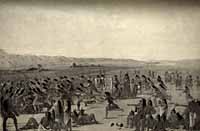 Ball Play of the Women |
|
... September 3.--The fatigue of the preceding day sent me to my leafy couch with a headache; and not having succeeded in destroying all the mosquitoes in my tent, I passed a disagreeable night, and was glad to get up at break of day. A fine, fresh, and fair breeze was stirring; so rigging a small sail, and getting my somewhat sulky men aboard, we started at 6 A.M., and made fine way against the current. We passed numerous transverse valleys coming into the Mississippi at right angles, about 1200 yards wide, all of them presenting mural escarpments like those on the banks of the Mississippi. The Canadians call these transverse valleys "coulées:" none of them appeared to run very far into the interior, though some of them may be found to do so on inspection. ... About nine we stopped on the right bank to breakfast, at the foot of an elevated bluff, about 500 feet high, which I ascended. The top of this bluff was the natural summit level of the country; and although the traveller, when in his canoe, may think himself travelling between lofty mountains, as Carver and other early writers have expressed themselves, yet when he looks down upon the river from the summit level, he sees that the channel of the Mississippi, between bluff and bluff, is a trough which the stream has cut out of the main land, and that the two banks were once united upon the same level with that where he stands. The trough from the point where I stood was about two miles wide, of which the water occupied but a limited portion, the existing main channel of the river having a serpentine course from the east to the west side, sometimes keeping one side for several miles, whilst the rest of the width was occupied by low flat islands, divided by inferior channels, the whole width being about two miles. I could perceive that the bluffs on the east side were occasionally intersected by lateral valleys a mile in width, all of them well wooded; these last being again intersected by minor valleys running parallel to the line of the river. Everywhere mural escarpments were to be seen, and the same siliceous cornice peeping out. It would be difficult for a geologist to look upon a rarer or more instructive scene. |
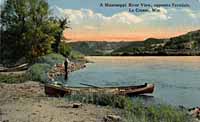 |
|
We left our breakfast fire at half-past ten, and near twelve passed a fine cape, on the west bank, rounded at the termination with a mural escarpment, fronting the river, that seemed a work of art. The main channel was about 350 yards wide; and the wind veering round, we were obliged to take down our sail, and apply to the paddles again. We now passed a deep cove, between two remarkable capes, with truncated escarpments: one of these capes had been called Cap à l'Ail, from the circumstance of wild onions growing on the banks of a rivulet in the cove. At half-past two P.M. my men pointed out to me the mouth of Bad-axe River, on the east bank, a stream where the Sacs and Foxes, who under the Indian chief Black Hawk had taken up arms against the Americans in 1832, received the fatal blow which crippled them as a nation. Colonel Taylor and other officers engaged in this affair, had given me an account of it, which appears to have been badly managed both by the Indians and Americans, the latter of whom had nearly lost all their advantages from the want of a commissariat. About 4 P.M. we got into a calm channel, about 100 yards wide, which wound about very tediously. Immense quantities of scarlet lychnis, in full blossom, were growing upon the banks of the small islands. This breadth of 100 yards continued for about ten miles, when we again got into the main channel, about 250 yards wide. A heavy rain now fell upon us, and we soon became thoroughly wet through, and so uncomfortable, that we landed on the west bank; and having got our fires built, and the tent pitched, I changed my clothes, and had stakes put round my fire to dry my wet garments upon. Leaving them to take their chance between the rain and the fire, I supped and lay down, whilst torrents of rain were pouring down in one of the darkest nights I ever saw. |
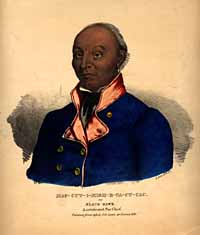 Black Hawk |
|
September 4.-- ... Leaving our encampment at 8 A.M., we pursued our way; but the rain returning in very copious quantities, we went muddling on in it until half-past ten, when we stopped to breakfast in a very uncomfortable manner; and getting into the canoe again at twelve, continued on amidst a perfect deluge of rain, until all of us being done up with ennui and discomfort, I turned into a pretty cove, about half-past four, under the bluffs of the east bank, and we set to work at the old business of building up good fires. Whilst these were burning up, having plenty of daylight before me, I commenced the ascent of the bluff, which was here about 500 feet high. I had dressed myself this day in a new suit of patent waterproof clothes and leggings, for which I had paid a corresponding price: according to the theory of the thing, therefore, I had some right to suppose myself dry and tolerably comfortable. Of this I had some misgivings when I landed, and had not proceeded far through the tall grass, which was loaded with rain, when I arrived at a perfect conviction that I had never been more thoroughly wet through in my life. Soon after I reached the top the rain ceased, and the weather became clear. I enjoyed here another of those magnificent views which abound on the heights of the Mississippi. The valley betwixt the opposite bluffs was here near three miles wide, and I seemed to look down upon an immense forest, growing upon innumerable islands, among which various streams were gliding. Some of the islands were so extensive as to contain ponds of considerable extent, and large areas of the zizania, already frequented by the wild fowl, which had begun to arrive from the north in immense quantities. In every direction the same features were exhibited; the bluffs of the opposite banks were always of nearly the same height; shewing in the clearest manner that the valley before me was an immense furrow, which had been worn out in the country by the long action of water. These scenes never satiate the eye and the mind; and I availed myself of every opportunity, when we landed, to renew the enjoyment of them. Whilst wandering about here, I sprung two beautiful broods of Tetrao, which immediately took to the trees. I could have shot several of them, but had not my gun with me. Descending by a different direction, to examine a naked escarpment, I found the siliceo-calcareous rocks alternated often with sandstone, with strong beds of sandstone of a rather compact kind at the base; but I could find no fossils in any of the beds. Having reached the camp a little after sunset, I hastened to relieve myself of my bedrabbed patent water-tight garments; and after a hearty supper, commenced the fatiguing business of drying everything by the fire, which occupied me until a late hour. Meantime, my people, who cared nothing about being in wet clothes, as soon as they had made their accustomed carnivorous meal, and enjoyed their noisy conversation and their pipes, wrapped themselves up in their blankets, and were soon all asleep. ... |
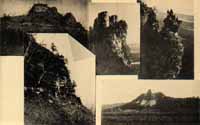 Mississippi River Bluffs |